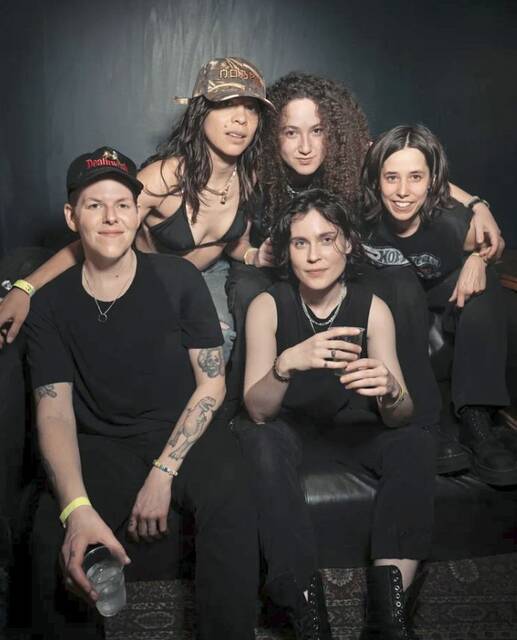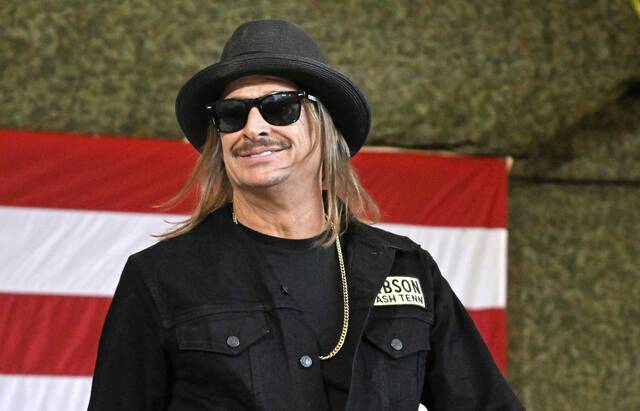The Crane Wives’ upcoming fall tour feels about the same as always to the band, even with no fresh album to promote.
With a sound that has evolved from folk to more indie rock over the years, the Michigan band released “Beyond Beyond Beyond” more than a year ago, and is hitting the road again in the Northeast for two weeks.
“I personally feel like the pressure is pretty similar. It was nice to have the album, to be honest, because it’s easy promotion material, do the thing, an easy actionable item. And now it’s kind of just like, I hope you still like us. Please come hang out with us for some time,” guitarist/vocalist Emilee Petersmark said with a laugh.
As bassist Ben Zito put it, the band’s released five albums over 15 years of touring, so there have been plenty of empty spaces with nothing to promote.
“You just go out there to hope people show up,” Zito said. “And then, for five of those years…”
“You have something to offer,” Petersmark finished.
If past history is any indication, they’ll be OK in Pittsburgh. The band’s last two shows here sold out — in 2023 at Club Cafe and 2024 at Mr. Smalls Theatre. The Crane Wives — who also include guitarist/vocalist Kate Pillsbury and drummer Dan Rickabus — are making the move to Stage AE for a Nov. 8 show with Spencer LaJoye opening.
In a Zoom conversation from Grand Rapids, Michigan, Petersmark and Zito spoke with TribLive about new releases, their shifting sound, their fan base, the Decemberists and more. Find a transcript of the conversation, edited for clarity and length, below.
“The Fool in Her Wedding Gown” and “Safe Ship, Harbored” were just reprinted on CD. What does it take to reprint the CDs? Do you plan on revisiting some more of those songs on the tour?
Zito: We did it!
Petersmark: (laughs)
Zito: I’ll speak to that, I’m kind of the money guy.
Petersmark: The manager.
Zito: The manager. There’s some back end involved. Basically we were working on “Beyond Beyond Beyond” and we were carrying some debt from producing “Foxlore” and “Coyote Stories” all the way back in 2015, 2016, and then this fan base found us and we were able to play some shows and save up some money to pay down that debt, and then we were able to put “Foxlore” and “Coyote Stories” on vinyl. Then we produced a whole other album and put that on vinyl, and these all come with a certain amount of expenses. There wasn’t a lot of desire on our behalf to revisit things that are 15 years old, be like, oh yeah, that’s not new and exciting is all. But our fans made it really clear that that was a priority, so we heard it loud and clear and finally got the repress done. We just wrapped up our “Beyond Beyond Beyond” promo tour and everything, so we thought it’d be a good time to give them something to be excited about and we could pull some attention away from “Beyond Beyond Beyond,” put it back on the stuff that they want to hear, and it’s been really great to offer that to them. They’re very excited. It’s great.
Were the original runs a smaller amount so it was just very hard for people to find?
Zito: Yeah, I mean, the original runs, the last one we did was probably in 2015. And they’re not small amounts, and we do at least a thousand at a time. I mean, small compared to Taylor Swift, I’m sure. But they just dried up. And we’re the only ones that sell them. You can’t go to a retail store and find our music. You have to go to our online store to find it.
Petersmark: You could for a time find it on eBay. I think a copy of “The Fool” was going for $180, which is outrageous. (laughs)
Zito: We sell it for $10.
Zito: So it wasn’t a limited run or anything. It just sold out years ago. And then we put our money toward other things like seeing our fans on the road and producing other albums and everything. Now that those albums are profitable, we can go back and revisit the old stuff without feeling this thing.
Petersmark: Yeah, I feel like for a lot of our business plan, we try to do things in a way that feels sustainable. We are not backed by a label. So everything we do is self-funded and self-produced. I do feel like people have been asking about those records for some time. But there were a lot of steps for us in between, like getting the original master tracks, which was already kind of like where are they? Where did you put those?
Zito: I knew where they were. I got them all under lock and key. I know where everything in the studio is. It’s all organized.
Petersmark: There were a lot of steps that we had to take, and mostly Zito had to take as the manager. So it was just a lot of pieces to get in place while we were also making a record, producing that record, selling that record as well. So this just kind of felt like the perfect time, now that we have a little bit of space.
“Beyond Beyond Beyond” came out about 13 months ago. So now that that time has passed, are you satisfied with how it turned out in hindsight? Did it feel like a big departure from your previous albums, or did it feel like maybe a natural evolution?
Petersmark: I definitely feel like I’m very proud of what we’ve made. I think that over time, from the start of writing the music to where we are now, a lot of personal experiences come in and it has created this change into how the record feels. But it is really exciting to have had that experience of the full release, the full promotional cycle and experiencing that on this new level that we’ve never had before. With all of the support that we have, we were able to hire a PR team and we’ve got this amazing booking agency, Mint, that has been helping us as well to book shows and handle our social media.
Having that support, because before it was just the four of us wearing different hats and answering the same phone, this feels so much better to have a team that you can count on. This experience with this release has just been leagues different than what we’ve experienced with even “Coyote Stories” and “Foxlore.” I think ultimately I just feel super proud of what we’ve accomplished. I’m excited to see what else we can do with the resources that we have now.
Zito: Yeah, agreed. And I would add to your question about the material. Does that feel like a natural progression? I think that we fell right into those. None of those songs were forced or even thought about like, oh, what if we did something new and crazy. It was all very much like, oh, yeah, this tone goes here. And maybe from “Foxlore” to “Beyond Beyond Beyond,” that feels like maybe kind of a jump. But there were a lot of singles that we released in between those two. And if you listen to those like fuzz bass driving on “Empty Page,” and just like some loud rock ‘n’ roll stuff in there, “Take Me to War” is just a very angry song. It’s all electric. And from “Foxlore” to “Beyond Beyond Beyond,” I think we have seven singles. If you listen to those, in the context of that timeline, eight years, very natural progression I think. Very happy with it, very proud of it. It’s a very fun album, fun songs to play.
Petersmark: I think that the biggest change between 2015 Crane Wives and 2022, whenever we started this “Beyond Beyond Beyond” …
Zito: Summer of 2023.
Petersmark: … is just that we’ve had a lot more freedom to play and to take risks with the sound, whereas before, I feel like we were still doing that with the previous records but more in a set parameter of boundaries with the instruments that we had and trying to be able to recreate it in a live show, and now we’ve moved beyond needing to make something that we can recreate perfectly from the album. Now we get to experiment with new gear and new pedals and new tones and just playing with the sound in ways that aren’t stereotypically folk.
Were you worried about alienating or ticking off any of the fans who got on board with the folkier side of the band? Was that a concern or just something that you had to do?
Petersmark: We always knew that we would lose people in changing because there are some people who want you to make the same type of music forever. And I understand that. People were mad at the Beatles for changing. But I also just feel like we were at this place, part of feeling safe enough to play around was feeling secure enough and knowing that the people who will like this will be our people. They’ll be the people that this music was meant to find.
Zito: I was just gonna throw in that the only conversation we really had regarding “Beyond Beyond Beyond” and the direction it was taking was that we wrote “Coyote Stories” and “Foxlore” in kind of a vacuum. We didn’t have many fans listening at that time, and we were like OK, we’ll just do that again, just pretend they’re not there, do what we want basically. We’ll just do whatever we want and if they like it, great, and if they don’t, hopefully we do.
Petersmark: Yeah, and those that don’t still have the older records. The cool thing I think about the evolution of being a band is knowing that all of the old stuff still exists and is still accessible and we still play it. We’re probably going to play songs from “The Fool” and “Safe Ship” sprinkled throughout this tour, and we still love those songs. It’s just, we wanted a bigger sandbox. (laughs)
Zito: Honestly, I just had the realization that we really worked hard between “The Fool and Her Wedding Gown,” 2012, and “Coyote Stories,” 2015. We worked really hard wondering about what the fans would think then because we had a banjo player on those first two albums and we didn’t on three and four. And we were like, OK, well, we have to include banjo on this track. Otherwise, people will wonder where the banjo is. There are a few songs on “Coyote Stories” where Emilee plays banjo.
Emilee: I’m really bad at the banjo, by the way.
Zito: So I think we actually felt that pressure more back then than we did this time around because we were like OK, well why bother with that? Why bother having pressure?
Petersmark: Well, it had already been almost seven years between records at that point.
So it’s like there was such a gap that I feel like if you’re not listening to the singles, of course there’s going to be an evolution or a change that might feel jarring because I just feel like as musicians, if you’re growing, if you are inspired, then you’re not going to be making the same stuff over and over again probably.
Related
• Top Pittsburgh concerts for November: Paul McCartney, Billy Strings and more• Q&A: Jenna Fournier on Kid Tigrrr project, One Night Live, touring with Billy Corgan
• 2025-26 Pittsburgh area concert calendar
It seems like the band’s fan base is almost like a community. Could you ever imagine that it would develop the way that it has?
Petersmark: No, at least I feel very lucky. I feel like we hit a jackpot somewhere that we weren’t even trying for, to find these people. For the first 10 years of us performing as a band, we played a lot of breweries. We came up as a band during the brewery boom in Grand Rapids and elsewhere. So a lot of our touring was through bars, and our crowds were much older. It was never a bad time, but it was definitely a different kind of audience.
And I feel like now we have this audience that connects very deeply to the music and less deeply to the experience of going out to a show. So for a lot of those fans, sometimes it’s their first time at a concert ever so it’s exciting and an honor to be their first experience with live music, and we get to set the standard for what to expect. So we really pride ourselves on having shows that emphasize just being considerate and taking care of each other. We keep getting the feedback from venues that our fans are the nicest people in the world. So I feel like we don’t really have to do much curating. We’re just really lucky.
I also wanted to check in and see how important social commentary is for the band. It seems like it’s part of the foundation of this group.
Petersmark: I think that we’ve tried really hard to say things that we felt were important to us with the music about how we were living and how we were being treated, a pretty feminist perspective. It’s been nice to find ways to let that out in the music. And we definitely try not to shy away from those meanings. That said, in this current political climate, we’ve been trying to be more careful about creating a safe space for our fans at shows. So a big part of that is just making sure that they feel comfortable, that people aren’t being antagonized while they’re there.
A couple of times we’ve had some off-the-cuff comments where we’re on a mic and talking about what a song is about. And then later we’ll get some hate mail from an angry dad who is very upset that we had spoken so candidly. That stuff has never discouraged us, but we are definitely taking a lot of those moments more seriously because we do want our fans to be able to show up without fear of being confronted by an angry dad. That sort of thing, particularly because they are so young, is a huge priority for us. So yes, we speak out. And yes, we have very strong opinions. But we are really trying to find a balance of being true to who we are and what we believe while also maintaining a space that feels comfortable for these young kids who aren’t used to necessarily being out in a public space with a lot of people who they don’t know.
The band’s name is taken from a Decemberists album and song. Have you ever met the band? Have you heard from them at all?
Petersmark: Ah, I’ve had this letter to Colin Meloy sitting on my desktop for like 10 years now, but we had this very brief online interaction with them when we first became a band. We had submitted a copy of “Safe Ship” to Tiny Desk, and at the time it was just like open submissions. We just sent it in knowing that it would sit in a pile and then probably be shuffled into a trash can eventually. No real expectation there, but one day we got an email from the guy who runs their submission, Robin (Hilton). He emailed us a very brief email about how, just letting you guys know that the Decemberists were in today for their Tiny Desk, and they liked your band name and they sent us this photo of Colin Meloy holding up “Safe Ship.” And it was just such a mind-blowing moment for us as like little baby Crane Wives to have this person who was such an influence on our songwriting at the beginning, like he somehow noticed us.
Zito: I want to point out. You said it was a Tiny Desk submission, but I think that that album predates the concept of Tiny Desk. I think we just sent it to NPR to be like, hey play this on “All Songs Considered,” and they were like no.
Petersmark: (laughs) The dreams, the dreams we had. But a couple of times we’ve had some friends who’ve performed with the organ (and) accordion player, Jenny (Conlee). And they’ve mentioned us, and it sounds like the Decemberists are aware of who we are, which is horrifying and amazing.
Zito: Well, we’re aware of who they are too.
Petersmark: (laughs) One day I feel like we’ll have to meet. Like I said, I’ve had this letter drafted to Colin Meloy for years about how much he’s impacted my life in ways that I’m sure he has no idea. But it feels really nice to be connected in that way to this one band that lives forever in the back of my mind as this songwriting monolith. So yeah, we love them.








